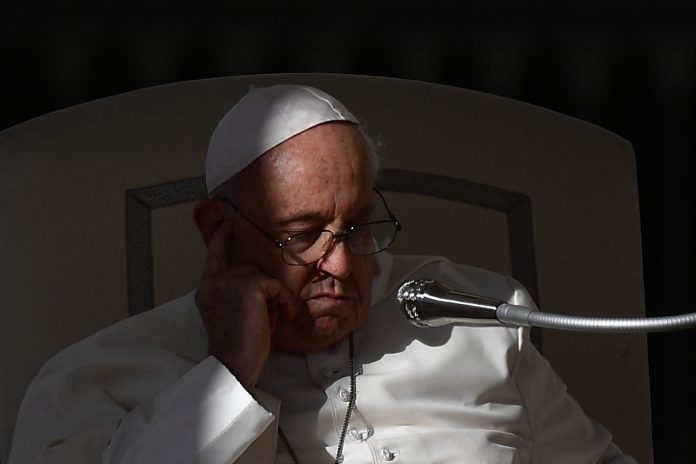It was Easter Sunday. I had just watched him on the Vatican newsfeed—frail, breathless, but still resolute, as he imparted the traditional blessing Urbi et Orbi to the city and the world. His voice trembled slightly as he commended the faithful to the mercy of the Triune God. His breathing was labored, and yet, he pressed on. It felt like an act of holy defiance, a last burst of strength offered to the Risen Christ for the sake of the people. I made the sign of the cross from where I stood, and I remember thinking to myself, he looks tired, but he is still giving everything he has. Then came that gentle wave of the hand—hesitant, tender, almost like a whisper. It felt like a goodbye.
The next day, Easter Monday, a little after lunch in the Philippines, my phone rang. The call was from his dear friend, Gerry O’Connell, the journalist who, with his wife Elisabetta, had known him back when he was just Cardinal Jorge Mario Bergoglio of Buenos Aires. They had had their children baptized by him. I had never heard Gerry’s voice like that—urgent, trembling. “He’s gone,” he said, confirming what I had begun to suspect from the flurry of posts on social media. “You should come to Rome as soon as you can. The Dean of the College will surely call for the General Congregations. Don’t wait to be summoned. Elisabetta and I hope to see you here.”
I could not speak. My vision blurred. I felt a weight press down upon me. I stepped out into the garden and found a seat under a cluster of yellow bamboo trees. I listened to the wind as it rustled through the leaves, as if nature itself was mourning. My mind began to reel, replaying my few precious encounters with this Pope who had, for me, made the mercy and compassion of the original Jesus of Nazareth come alive again.
He made me weep like a son weeps for a father. Because somehow, in the depth of his gaze, in the tenderness of his voice, in the gravity of his silences—I had felt fathered. This was no distant pontiff. He walked with a limp and smiled with his eyes. He smelled like the sheep he tended. I remembered that leaked speech he had allegedly delivered to the general congregation of the College of Cardinals before the 2013 conclave—about a Church that becomes sick from being too self-referential, and must instead go out of itself to reach the margins. Later, after he released his apostolic exhortation, Evangelii Gaudium, I studied that speech again line by line and, using my redaction-critical tools in exegesis as a bible scholar, found it authentic. Every word bore the typical style of the former archbishop of Buenos Aires, who, to a great extent was also said to be responsible for the Aparecida document of the 5th General Conference of the Bishops of Latin America and the Caribbean.
When he stepped onto that balcony in his plain white cassock and greeted the crowd simply with Buona sera—then bowed his head and asked for the people’s blessing—I knew at once that we were in for something new. And indeed, it was a different kind of papacy. One that breathed. One that listened. One that walked barefoot across the burning sand of the world’s pain.
He made surprising decisions. He chose not the Apostolic Palace but a modest room at Santa Marta. He shrugged off papal pomp and vestments of triumph. He embraced refugees, washed the feet of prisoners, blessed the disfigured, smiled at street children. He said Mass for garbage collectors and mourned the forgotten dead. His words carried the weight of Gospel truth: “Who am I to judge?” “The Church is not a customs office.” “Time is greater than space.” “Reality is more important than ideas.”
He dared to imagine a synodal Church: one that walks together, listens deeply, discerns prayerfully. He asked us to dream—not of power, but of participation. He envisioned a Church with an Amazonian face, an Asian soul, a youthful spirit. A Church that does not fear messiness, for the Spirit dwells in the unpredictable.
He reached out to Christians of every stripe—Orthodox, Evangelicals, Anglicans—and extended a fraternal hand to Muslims, Jews, Hindus, Buddhists. He believed in bridges, not walls. He saw creation not as commodity but as common home. In Laudato Si’, he cried out for the earth like a psalmist of old, inviting humanity to ecological conversion.
But above all, he reminded us—by word and by life—that God’s name is Mercy. That the Church must be a field hospital, not a fortress. That we must not merely admire Jesus from a distance but follow him—closely, humbly, vulnerably.
And now, he is gone.
I sat under the bamboo that afternoon, and I wept—not as a cleric for a pope, but as a child for a father. A father who had tried, against the tides of resistance and cynicism, to help us remember who we are: a people saved by grace, broken but beloved, called to tenderness and mission.
Francis of Rome, like Francis of Assisi, has gone to the Father. But his spirit lingers. Not in marble or bronze, but in the way the Church now breathes, walks, and listens.
Buona sera, Papa Francesco. We bless you now, as once you asked us to bless you. And we will remain, walking forward in the love of Christ, just as you taught us.
Cardinal Pablo Virgilio David of Kalookan, president of the Catholic Bishops’ Conference of the Philippines and vice president of the Federation of Asian Bishops’ Conferences, was among the 133 cardinal-electors in the 2025 conclave that elected Pope Leo XIV. A biblical scholar and outspoken advocate for human rights and social justice, Cardinal David is known for his pastoral presence in impoverished communities and his strong stance against violence, poverty, and corruption in Philippine society.









